Coronavirus: How face masks are becoming fashionable
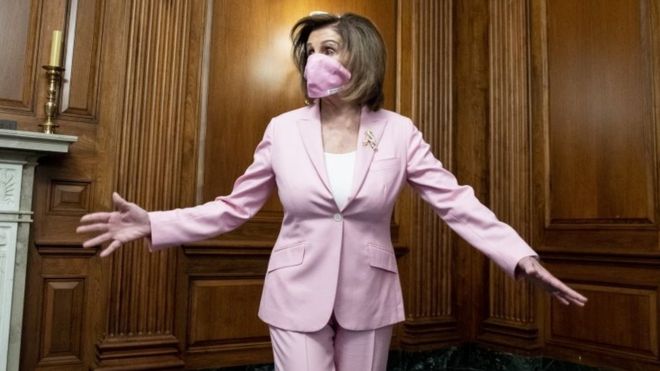
"Everyone is on it right now including designers. It is a necessary fashion statement right now," says Angel Obasi who runs the Instagram account Styleconnaisseur.
Ms Obasi posted images of a matching mask and suit outfit she wore to a Zoom wedding when the pandemic began. More than 100,000 people liked the images of her outfit on Twitter.
She told the BBC that she has worn the mask several times as it is "best for my style and obviously for keeping safe".
- Facemasks at Fashion Week amid coronavirus concern
- Designer brand Ralph Lauren to make masks and gowns
Ms Obasi isn't the only person ensuring she remains safe and fashionable. High-profile figures have also started to match their masks to their outfits.
Speaker of the House of Representatives, Nancy Pelosi, was dubbed "Leader of the House Majority, and of mask-to-pantsuit colour coordination" by Hillary Clinton on
Thursday.
Ms Pelosi has sported a number of matching ensembles over the past month.
Pelosi has sported a number of matching ensembles over the past month.
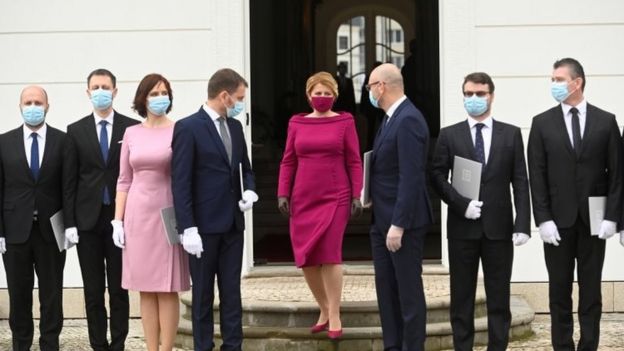 REUTERS
REUTERS
President of Slovakia Zuzana Caputova received praise online for her matching mask ensemble which was dubbed by one social media user as "modern day corona".
With the trend rising, many fashion designers are taking note and now creating their own matching outfits. Givenchy even released their own mask and cap combo. However it will set you back £425 (£514).
One designer in Italy hit the headlines this month when she created the trikini - a matching bikini and face mask set.
Tiziana Scaramuzzo, owner of Elexia Beachwear, said she created the trikini as a joke but after she posted images of the set to social media, she was inundated with orders.
Room Shop Vintage in the US started selling matching mask and top sets when their head of manufacturing sent over images of a sample.
"Seeing the samples really sparked something in me and that is when we went forward with the idea," Shelly Horst co-founder of Room Shop Vintage told the BBC.
"The reception to our matching top/mask set has been really great. Our customers love a matching look. Having a mask that matches their top makes the mask more fun and whimsical to wear, something that is important in such as serious, scary time."
She said she expected the trend to continue.
"Going forward people will need multiple masks in rotation especially as things begin to open back up. Having a mask that matches exactly is a fun fashion move, but matching through colour stories will start to happen as well. Considering what mask to wear will become a part of planning an outfit."
It's not just matching sets that are becoming popular. Other designers are making masks as glamorous as possible, rhinestones and all.
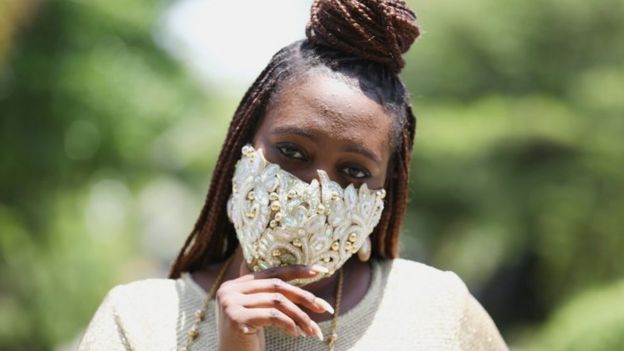 REUTERS
REUTERS
Sefiya Sjejomaoh told Reuters news agency that the pandemic should not get in the way of her sense of style.
"When you come out in a stylish mask or with an accessory such as this, it doesn't seem as though we're fighting a war.
"It seems more fun," she said.
How the Fashionable Face the New Coronavirus
May 15, 2020
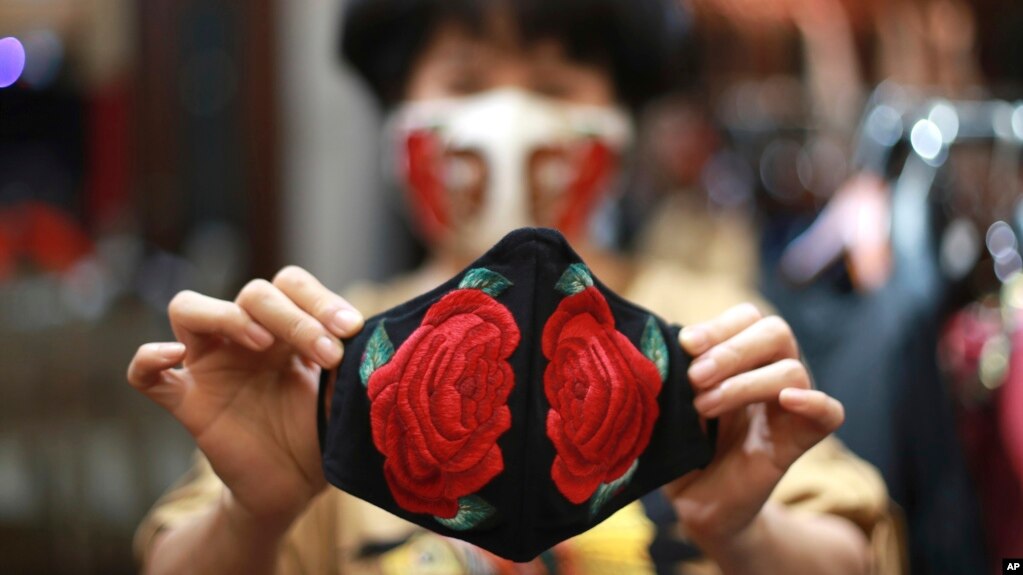
In this Wednesday, April 15, 2020, photo, fashion designer Do Quyen Hoa shows off an embroidery face mask at her studio in Hanoi, Vietnam. The collection of face masks adorned with Vietnamese hand embroideries was created as the world is fighting against
Share
How the Fashionable Face New Coronavirus
by VOA
I’m Caty Weaver=
Caty Weaver wrote this story for VOA Learning English, with reports from Associated Press, Reuters and others sources. Hai Do was the editor
Face mask fashionistas get creative in the age of coronavirus
Barbara Goldberg HEALTH NEWS APRIL 22, 2020

Share
How the Fashionable Face New Coronavirus
by VOA
Many people around the world now wear masks, covers for their nose and mouth, when they go out in public. You see masks on people walking their dogs, buying food, riding bicycles and working at their jobs.
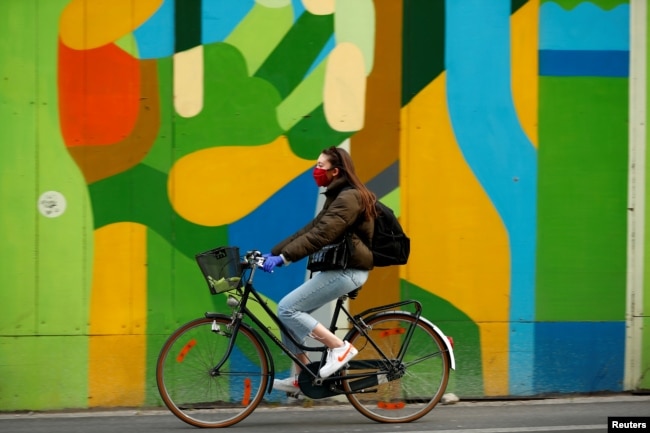

FILE PHOTO: A woman wearing a protective mask rides her bicycle during the coronavirus disease (COVID-19) outbreak, in Brussels, Belgium April 16, 2020. REUTERS/Francois Lenoir/File Photo
In many places the masks are required by law as a measure to prevent the spread of COVID-19. But commercial masks are in short supply. Most people agree that those rare objects should go to health care professionals and others on the so-called front lines of the fight against coronavirus.
So, mask-making has gotten more personal for the rest of us and more creative in design, as a result. It seems masks are becoming the fashion statement of 2020.

In many places the masks are required by law as a measure to prevent the spread of COVID-19. But commercial masks are in short supply. Most people agree that those rare objects should go to health care professionals and others on the so-called front lines of the fight against coronavirus.
So, mask-making has gotten more personal for the rest of us and more creative in design, as a result. It seems masks are becoming the fashion statement of 2020.

A street vendor wearing a face mask poses outside the central market in San Salvador on May 6, 2020, amid the COVID-19 coronavirus pandemic. (Photo by Yuri CORTEZ / AFP)
The online news media site Insider recently published photos of 17 of the most creative masks it found around the world. Many of the mask makers are artists, but not all. The photos include a knitted piece of pink and red from Icelandic-based cloth artist, Ýrúrarí. It is a large mask made to look like a big mouth with a long pink tongue hanging out.
The report also shows a smart design from leather worker Anissa Mekrabech of France. She created a mask with see-through material over the mouth. It permits people who read lips, because they can not hear, to continue to communicate during the pandemic
Some of the masks among the photos are beautiful. Some artists made masks covered in shiny, colorful jewels or mirror-like material. Another uses paint to create bright pictures on paper masks. A few of the masks are made of plastic and other waste material found on the street. One clothing designer even made a special mask to go with wedding clothes.
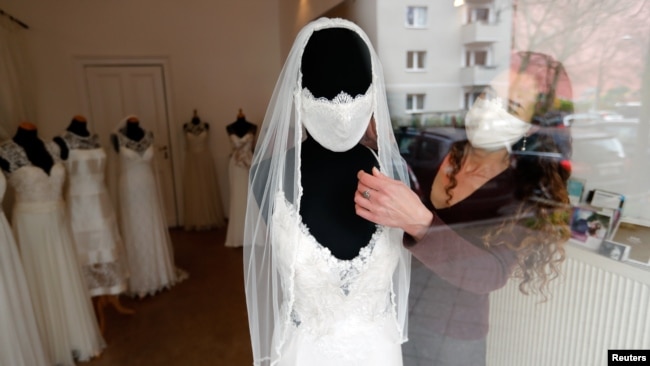
The online news media site Insider recently published photos of 17 of the most creative masks it found around the world. Many of the mask makers are artists, but not all. The photos include a knitted piece of pink and red from Icelandic-based cloth artist, Ýrúrarí. It is a large mask made to look like a big mouth with a long pink tongue hanging out.
The report also shows a smart design from leather worker Anissa Mekrabech of France. She created a mask with see-through material over the mouth. It permits people who read lips, because they can not hear, to continue to communicate during the pandemic
Some of the masks among the photos are beautiful. Some artists made masks covered in shiny, colorful jewels or mirror-like material. Another uses paint to create bright pictures on paper masks. A few of the masks are made of plastic and other waste material found on the street. One clothing designer even made a special mask to go with wedding clothes.

Fashion designer and tailor Friederike Jorzig presents a face mask for wedding dresses in her shop 'Chiton', as the spread of the coronavirus disease (COVID-19) continues in Berlin, Germany, March 31, 2020. REUTERS/Fabrizio Bensch
Masks could be new little black dress
We might be covering our faces and mouths for quite a while. And not just for COVID-19. There are lots of possible viruses ahead. And there is air pollution and toxic dust, allergies and bad smells. So, are masks our fashion forward look?
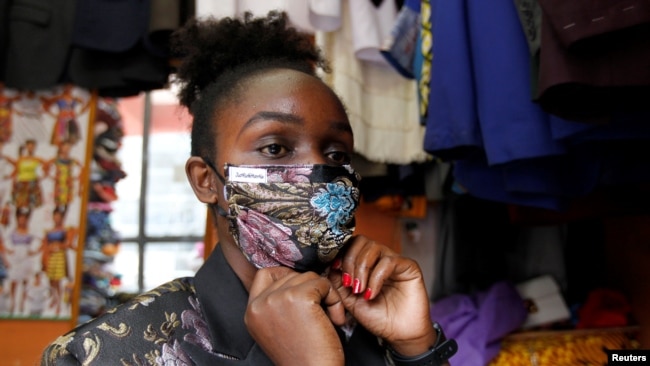
Masks could be new little black dress
We might be covering our faces and mouths for quite a while. And not just for COVID-19. There are lots of possible viruses ahead. And there is air pollution and toxic dust, allergies and bad smells. So, are masks our fashion forward look?

Kenyan fashion designer Ruth Martin fits a protective face mask as part of her latest creation inside her studio, as a measure to stem the growing spread of the coronavirus disease (COVID-19) outbreak, in downtown Nairobi, Kenya April 9, 2020. REUTERS/Nje
Fashion bible Vogue seems to think it might. On May 5, it published 92 Cloth Masks To Shop Now. Writer Sarah Spelling notes that that mask cover a large part of the face. So, she writes, it is not surprising people are looking for masks that look good. And the story directs readers how and where to buy them.
And, in Lithuania this week, Reuters reported on a special fashion show held in the capital, Vilnius. There were no live models or crowds around a runway. Instead, the city celebrated creative face covers in photographs on 21 huge signs around town. The billboards show men, women and children wearing masks as part of a so-called “Mask Fashion Week.”
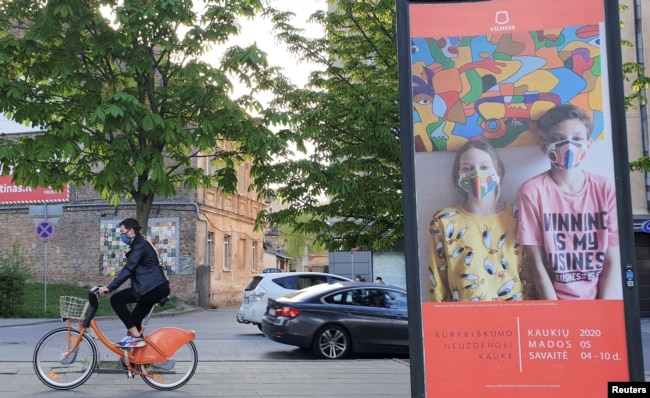
Fashion bible Vogue seems to think it might. On May 5, it published 92 Cloth Masks To Shop Now. Writer Sarah Spelling notes that that mask cover a large part of the face. So, she writes, it is not surprising people are looking for masks that look good. And the story directs readers how and where to buy them.
And, in Lithuania this week, Reuters reported on a special fashion show held in the capital, Vilnius. There were no live models or crowds around a runway. Instead, the city celebrated creative face covers in photographs on 21 huge signs around town. The billboards show men, women and children wearing masks as part of a so-called “Mask Fashion Week.”

A bicyclist rides next to a billboard, a part of a "Mask Fashion Week" during the coronavirus disease (COVID-19) outbreak in Vilnius, Lithuania May 5, 2020. REUTERS/Andrius Sytas
Those shown in the photos include local artists, musicians, and other townspeople chosen at random. Even the mayor of the city is captured on a Mask Fashion Week sign.
Members of a local Facebook group called Mask Your Fashion chose the masks for the signs. Designer Julija Janus established the group to share new designs for masks and advice on how to make them at home.
“A mask is a good way to display your creativity, to express yourself. And it’s a good activity to do when you’re sitting at home with the kids”, said Janus.
Mask or no mask
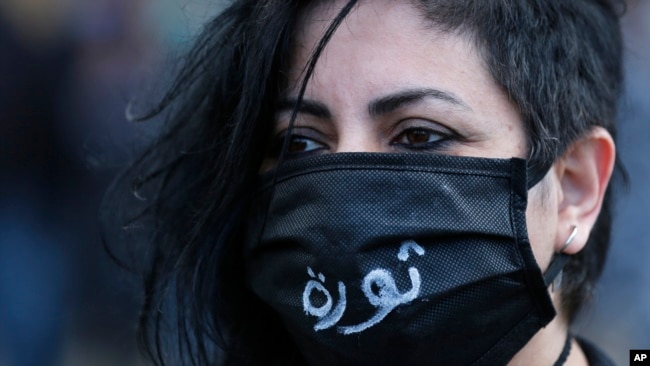
Those shown in the photos include local artists, musicians, and other townspeople chosen at random. Even the mayor of the city is captured on a Mask Fashion Week sign.
Members of a local Facebook group called Mask Your Fashion chose the masks for the signs. Designer Julija Janus established the group to share new designs for masks and advice on how to make them at home.
“A mask is a good way to display your creativity, to express yourself. And it’s a good activity to do when you’re sitting at home with the kids”, said Janus.
Mask or no mask

An anti-government protester wearing a mask to help curb the spread of the coronavirus with Arabic that reads, "Revolution," attends a protest against the deepening financial crisis, in Beirut, Lebanon, Monday, April 27, 2020. Photo: AP
Masks can also be used, or not used, to make political or cultural statements. President Trump does not wear one, so far. He has said he does not think a mask would send the right message when he meets with world leaders. He also suggested his wearing one might cause unease among the American public.
But some people have criticized his lack of mask use in public. They argue the decision belittles the seriousness of the pandemic. And last month, Trump’s vice-president Mike Pence was denounced by many for not wearing a mask when he visited with a COVID-19 patient at the Mayo Clinic, a famous medical center in the American state of Minnesota.
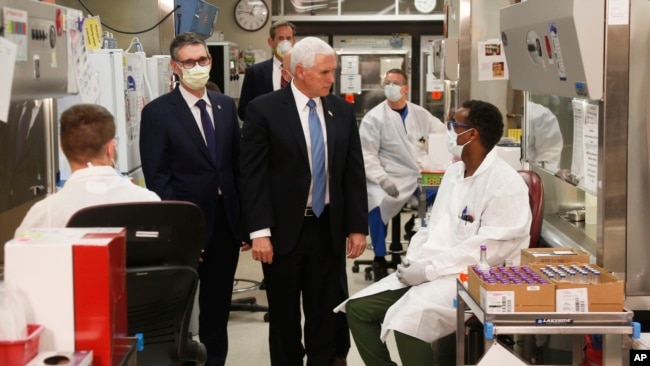
Masks can also be used, or not used, to make political or cultural statements. President Trump does not wear one, so far. He has said he does not think a mask would send the right message when he meets with world leaders. He also suggested his wearing one might cause unease among the American public.
But some people have criticized his lack of mask use in public. They argue the decision belittles the seriousness of the pandemic. And last month, Trump’s vice-president Mike Pence was denounced by many for not wearing a mask when he visited with a COVID-19 patient at the Mayo Clinic, a famous medical center in the American state of Minnesota.

Vice President Mike Pence visits the molecular testing lab at Mayo Clinic Tuesday, April 28, 2020, in Rochester, Minn., where he toured the facilities supporting COVID-19 research and treatment. Pence chose not to wear a face mask while touring the…
Pence later said he should have worn a mask at Mayo. And he put on a mask two days after for a visit to an American automobile factory.
Pence later said he should have worn a mask at Mayo. And he put on a mask two days after for a visit to an American automobile factory.
I’m Caty Weaver=
Caty Weaver wrote this story for VOA Learning English, with reports from Associated Press, Reuters and others sources. Hai Do was the editor
Face mask fashionistas get creative in the age of coronavirus
Barbara Goldberg HEALTH NEWS APRIL 22, 2020
FILE PHOTO: A woman wears a Wonder Woman mask as she waits in line at a Los Angeles Food Bank drive-through food giveaway as the global outbreak of coronavirus disease (COVID-19) continues, in Los Angeles, California, U.S., April 21, 2020. REUTERS/Lucy Nicholson/File Photo
NEW YORK (Reuters) - In the weeks since the coronavirus pandemic put the world into a tailspin, the humble face mask has evolved into an American fashion statement.
Now available in a myriad of styles and patterns, the now-ubiquitous facial covering has quickly replaced the T-shirt as the coolest way for nearly anyone - from firefighters and National Basketball Association fans to punk rockers and cat lovers - to tell the world about what they love. “People are getting creative with these masks. I love the individuality,” said Johnny Pisano, a touring musician who has added masks to a line of T-shirts he sells online to his fans. His masks feature an image of Pisano performing his signature stage move - leaping into a split while playing bass guitar.In the United States, 55% of adults reported wearing masks out in public, according to an ABC/Ipsos survey released on April 10.
They are now mandatory in many U.S. grocery stores, doctors’ offices and wine shops, and many are following official orders to wear a mask when they leave home and cannot maintain social distancing to avoid disease spread.
The Custom Shop in Glastonbury, Connecticut, a drapery and upholstery workroom shut down by the pandemic, is helping to fill the new demand by using its fabrics to make masks.Requests have come in for flame-patterned fabrics for firefighters, lighthouses for nearby Lighthouse Surgery Center, and kittens for cat lovers, said shop manager Jose Moncada.
Even the NBA and Women’s National Basketball Association have officially begun selling cloth face coverings sporting logos from all 30 men’s teams and all 12 women’s teams for $15, promising proceeds will benefit Feeding America in the United States and Second Harvest in Canada.
If the mask rule stretches into the fall fashion season in New York, the pandemic epicenter as well as the nation’s trend-setting capital, some commentators expect coronavirus couture to go entirely black, a color favored by the city’s arbiters of taste.
Others predict the hottest masks in these unpredictable times will restore the idea that bright is beautiful, catching looks with flowery fabrics, python skins and trendy logos.”It’s a little power moment. Masks are going to be that powerful health accessory that adds to your total look,” said Avril Graham, executive fashion and beauty editor at Harper’s Bazaar.”You might even be having evening, glamorous masks made to accessorize a gown or cocktail dress. Because there will be social distancing for months to come,” Graham said.
Back in Brooklyn, Pisano the bass player has plans for 150 custom-made masks to sell on Etsy.com, inspired by Facebook fans who posted pictures of themselves in similar homemade masks. His leaping bass player logo helps him sell about 100 of his commemorative items a year, most of them T-shirts. But citing his “New York street-sense,” he sees only a limited window for masks to do good and a time ahead when they are used for more traditional or sinister purposes.”Right now, because of how it is, everything is cool. I’m just afraid when it’s over - and they want to rob your house,” Pisano said.
(This story corrects spelling of “ubiquitous” in second paragraph)
I admit I have a hard time spelling it too.
NEW YORK (Reuters) - In the weeks since the coronavirus pandemic put the world into a tailspin, the humble face mask has evolved into an American fashion statement.
Now available in a myriad of styles and patterns, the now-ubiquitous facial covering has quickly replaced the T-shirt as the coolest way for nearly anyone - from firefighters and National Basketball Association fans to punk rockers and cat lovers - to tell the world about what they love. “People are getting creative with these masks. I love the individuality,” said Johnny Pisano, a touring musician who has added masks to a line of T-shirts he sells online to his fans. His masks feature an image of Pisano performing his signature stage move - leaping into a split while playing bass guitar.In the United States, 55% of adults reported wearing masks out in public, according to an ABC/Ipsos survey released on April 10.
They are now mandatory in many U.S. grocery stores, doctors’ offices and wine shops, and many are following official orders to wear a mask when they leave home and cannot maintain social distancing to avoid disease spread.
The Custom Shop in Glastonbury, Connecticut, a drapery and upholstery workroom shut down by the pandemic, is helping to fill the new demand by using its fabrics to make masks.Requests have come in for flame-patterned fabrics for firefighters, lighthouses for nearby Lighthouse Surgery Center, and kittens for cat lovers, said shop manager Jose Moncada.
Even the NBA and Women’s National Basketball Association have officially begun selling cloth face coverings sporting logos from all 30 men’s teams and all 12 women’s teams for $15, promising proceeds will benefit Feeding America in the United States and Second Harvest in Canada.
If the mask rule stretches into the fall fashion season in New York, the pandemic epicenter as well as the nation’s trend-setting capital, some commentators expect coronavirus couture to go entirely black, a color favored by the city’s arbiters of taste.
Others predict the hottest masks in these unpredictable times will restore the idea that bright is beautiful, catching looks with flowery fabrics, python skins and trendy logos.”It’s a little power moment. Masks are going to be that powerful health accessory that adds to your total look,” said Avril Graham, executive fashion and beauty editor at Harper’s Bazaar.”You might even be having evening, glamorous masks made to accessorize a gown or cocktail dress. Because there will be social distancing for months to come,” Graham said.
Back in Brooklyn, Pisano the bass player has plans for 150 custom-made masks to sell on Etsy.com, inspired by Facebook fans who posted pictures of themselves in similar homemade masks. His leaping bass player logo helps him sell about 100 of his commemorative items a year, most of them T-shirts. But citing his “New York street-sense,” he sees only a limited window for masks to do good and a time ahead when they are used for more traditional or sinister purposes.”Right now, because of how it is, everything is cool. I’m just afraid when it’s over - and they want to rob your house,” Pisano said.
(This story corrects spelling of “ubiquitous” in second paragraph)
I admit I have a hard time spelling it too.

















